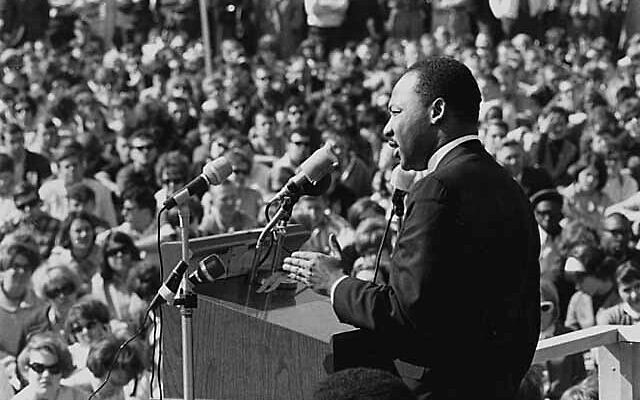Rabbi Robert Marx, who marched with Martin Luther King, dies at 93
Campaigner's legacy lives on through the Jewish Council on Urban Affairs and the Hakafa congregation in Chicago

Robert Marx, a pioneering social justice advocate and leading Reform rabbi who drew inspiration from his experiences marching with Martin Luther King, Jr., is dead at 93.
He died on March 28 at the beginning of the Passover holiday, surrounded by family at his home in Saugatuck, Michigan, the Chicago Tribune reported. He had suffered a heart attack weeks prior, the Chicago Sun-Times noted.
Marx’s legacy lives on through the Jewish Council on Urban Affairs, a community organising group devoted to social justice causes in Chicago that he founded in 1964, and the Hakafa congregation on the city’s North Shore that he founded in 1983, which grew from a few families to hundreds of members.
The Cleveland native, ordained at the Reform flagship Hebrew Union College in Cincinnati, was moved to make Holocaust comparisons after witnessing white Chicagoans pelt civil rights marchers with rocks and bottles in the summer of 1966. During the march, Marx reportedly sat guard in front of a pile of rocks so that the racist protesters could not use them.
“What I saw in Gage Park seared my soul,” Marx wrote in a letter to the Union of American Hebrew Congregations, which is now the Union for Reform Judaism. “I was afraid and I am afraid now. I saw how the concentration camp could have occurred, and how men’s hatred could lead them to kill.”
Quotes from that letter are inscribed on a memorial in Chicago’s Marquette Park to King and the infamous march, which King called the most hostile he had ever seen at the time. Marx marched with King in a follow-up in August of 1966, as he had in the famed Selma march of 1965.
Marx, whose Jewish Council fought racist housing policies and policing tactics, became one of the country’s leading Reform activists. He saw the causes of antisemitism and anti-Black racism as intertwined, and became a staunch ally of Chicago’s Black communal leaders — including Rev. Jesse Jackson, whose ties to the Jewish community were strained at best after calling Jews “hymies” in the 1980s and later standing up for controversial Palestinian leader Yasser Arafat. Marx said he felt “used” when Jackson met with Arafat.
“He was the Jewish voice for justice, working closely with the Black community and Black churches,” Jackson said about Marx in a statement, according to the Tribune. “We prayed together, sang together, and marched together. When Nazis marched in Skokie, we fought hate together. We have always been together. I love him so much. I miss him already.”
Marx was involved in other interfaith work as well.
“Part of his devotion to his faith and his love for his community was in ensuring that that community lived up to its highest ideals of justice and equality,” said Rami Nashashibi, head of the Inner-City Muslim Action Network.
Marx ran Congregation Solel in Highland Park from 1973 to 1983, after losing his 15-year-old son to a longstanding illness. He co-wrote a book called “Facing the Ultimate Loss,” for fellow grieving parents.
He is survived by the other child from his first marriage; his second wife Ruth; five stepchildren; and a total of 17 grandchildren.

Thank you for helping to make Jewish News the leading source of news and opinion for the UK Jewish community. Today we're asking for your invaluable help to continue putting our community first in everything we do.
For as little as £5 a month you can help sustain the vital work we do in celebrating and standing up for Jewish life in Britain.
Jewish News holds our community together and keeps us connected. Like a synagogue, it’s where people turn to feel part of something bigger. It also proudly shows the rest of Britain the vibrancy and rich culture of modern Jewish life.
You can make a quick and easy one-off or monthly contribution of £5, £10, £20 or any other sum you’re comfortable with.
100% of your donation will help us continue celebrating our community, in all its dynamic diversity...
Engaging
Being a community platform means so much more than producing a newspaper and website. One of our proudest roles is media partnering with our invaluable charities to amplify the outstanding work they do to help us all.
Celebrating
There’s no shortage of oys in the world but Jewish News takes every opportunity to celebrate the joys too, through projects like Night of Heroes, 40 Under 40 and other compelling countdowns that make the community kvell with pride.
Pioneering
In the first collaboration between media outlets from different faiths, Jewish News worked with British Muslim TV and Church Times to produce a list of young activists leading the way on interfaith understanding.
Campaigning
Royal Mail issued a stamp honouring Holocaust hero Sir Nicholas Winton after a Jewish News campaign attracted more than 100,000 backers. Jewish Newsalso produces special editions of the paper highlighting pressing issues including mental health and Holocaust remembrance.
Easy access
In an age when news is readily accessible, Jewish News provides high-quality content free online and offline, removing any financial barriers to connecting people.
Voice of our community to wider society
The Jewish News team regularly appears on TV, radio and on the pages of the national press to comment on stories about the Jewish community. Easy access to the paper on the streets of London also means Jewish News provides an invaluable window into the community for the country at large.
We hope you agree all this is worth preserving.





















